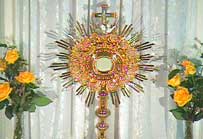|
God performs a miracle in each Mass. In fact, there has never
been a miracle as great as this anywhere on earth for 2000
years. And it happens in every Catholic church every day!
"'It is not man that causes the things offered to become
the Body and Blood of Christ, but He who was crucified for
us, Christ himself. The priest, in the role of Christ, pronounces
these words, but their power and grace are God's. This is
my body, he says. This word transforms the things offered"
(St. John Chrysostom; CCC 1375). "This change is not
like natural changes, but is entirely supernatural, and effected
by God's power alone" (St. Thomas Aquinas, Summa Theologiae
III, 75,4).
Such a miracle is beyond the power of man, but not beyond
the power of God. "' . . . Could not Christ's word, which
can make from nothing what did not exist [Gn 1], change existing
things into what they were not before? . . ." (St. Ambrose;
CCC 1375).
Reason says it is possible. But faith says it is actual.
Why do Catholics believe this astonishing fact - that what
seems to all human perception to be ordinary bread and wine
is in fact the body and blood of God incarnate? Because Christ
said so! "'Because Christ our Redeemer said that it was
truly His body that He was offering under the species of bread,
it has always been the conviction of the Church of God, and
this holy Council now declares again, that by the consecration
of the bread and wine there takes place a change in the whole
substance [being, essence] of the bread into the substance
of the body of Christ our Lord and of the whole substance
of the wine into the substance of His blood. This change the
holy Catholic Church has fittingly and properly called transubstantiation"
(Council of Trent in the sixteenth century; CCC 1576).
"The Eucharistic presence of Christ begins at the moment
of the consecration and endures as long as the Eucharistic
species subsist . . . " (CCC 1377). Since they remain
for about 15 minutes in the human body after being swallowed,
we should spend this time in prayer, thanksgiving, and adoration,
and not quickly turn to worldly occupations.
|
|
 |


